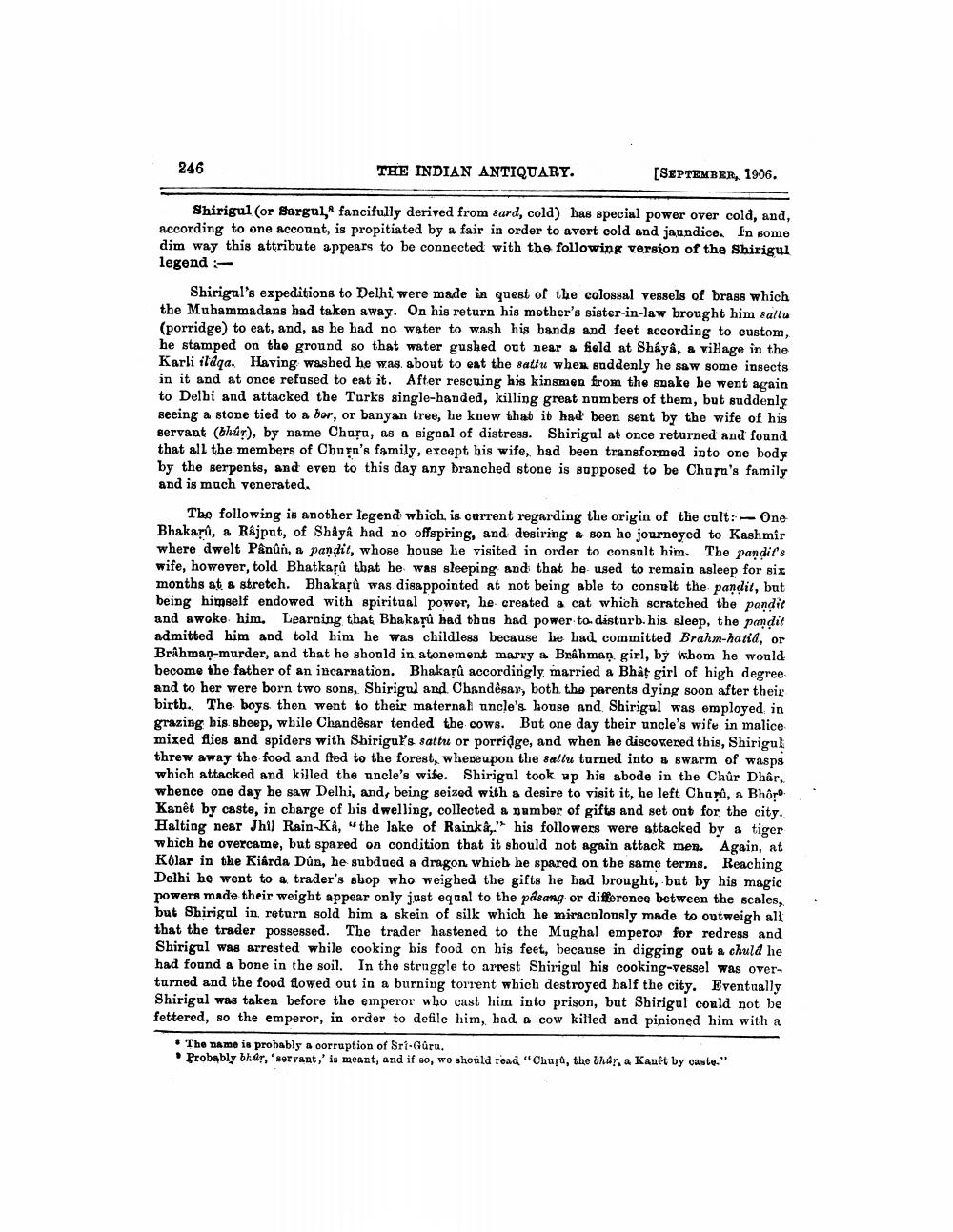________________
246
THE INDIAN ANTIQUARY.
[SEPTEMBER, 1906.
Shirigul (or Sargul, fancifully derived from sard, cold) has special power over cold, and, according to one account, is propitiated by a fair in order to avert cold and jaundice. In some dim way this attribute appears to be connected with the following version of the Shirigul legend :
Shirigul's expeditions to Delhi were made in quest of the colossal vessels of brass which the Muhammadans had taken away. On his return his mother's sister-in-law brought him sattu (porridge) to eat, and, as he had no water to wash his hands and feet according to custom, he stamped on the ground so that water gushed out near a field at Shâyâ, a village in the Karli ilaqa. Having washed he was about to eat the sattu when suddenly he saw some insects in it and at once refused to eat it. After rescuing his kinsmen from the snake he went again to Delhi and attacked the Turks single-handed, killing great numbers of them, but suddenly seeing a stone tied to a bor, or banyan tree, he knew that it had been sent by the wife of his servant (bhur), by name Churu, as a signal of distress. Shirigul at once returned and found that all the members of Chura's family, except his wife, had been transformed into one body by the serpents, and even to this day any branched stone is supposed to be Churu's family and is much venerated.
The following is another legend which, is current regarding the origin of the cult: One Bhakaru, a Rajput, of Shâyâ had no offspring, and desiring a son he journeyed to Kashmir where dwelt Pânûn, a pandit, whose house he visited in order to consult him. The pandit's wife, however, told Bhatkaṛû that he was sleeping and that he used to remain asleep for six months at a stretch. Bhakarû was disappointed at not being able to consult the pandit, but being himself endowed with spiritual power, he created a cat which scratched the pandit and awoke him. Learning that Bhakarû had thus had power to disturb. his sleep, the pandit admitted him and told him he was childless because he had committed Brahm-hatid, or Brahman-murder, and that he should in atonement marry a Brahman girl, by whom he would become the father of an incarnation. Bhakaṛû accordingly married a Bhât girl of high degree and to her were born two sons, Shirigul and Chandêsar, both the parents dying soon after their birth. The boys then went to their maternal uncle's house and Shirigul was employed in grazing his sheep, while Chandêsar tended the cows. But one day their uncle's wife in malice mixed flies and spiders with Shirigul's sattu or porridge, and when he discovered this, Shirigul threw away the food and fled to the forest, whereupon the sattu turned into a swarm of wasps which attacked and killed the uncle's wife. Shirigul took up his abode in the Chûr Dhâr, whence one day he saw Delhi, and, being seized with a desire to visit it, he left Churû, a Bhôr Kanêt by caste, in charge of his dwelling, collected a number of gifts and set out for the city. Halting near Jhil Rain-Kâ, "the lake of Rainka," his followers were attacked by a tiger which he overcame, but spared on condition that it should not again attack men. Again, at Kôlar in the Kiârda Dûn, he subdued a dragon which he spared on the same terms. Reaching Delhi he went to a trader's shop who weighed the gifts he had brought, but by his magic powers made their weight appear only just equal to the pasang or difference between the scales, but Shirigul in return sold him a skein of silk which he miraculously made to outweigh all that the trader possessed. The trader hastened to the Mughal emperor for redress and Shirigul was arrested while cooking his food on his feet, because in digging out a chuld he had found a bone in the soil. In the struggle to arrest Shirigul his cooking-vessel was overturned and the food flowed out in a burning torrent which destroyed half the city. Eventually Shirigul was taken before the emperor who cast him into prison, but Shirigul could not be fettered, so the emperor, in order to defile him, had a cow killed and pinioned him with a
The name is probably a corruption of Sri-Guru.
Probably bhur, 'servant,' is meant, and if so, we should read "Churd, the bhur, a Kanêt by caste."




